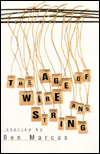
The Age of Wire and String
The Age of Wire and String Ben Marcus The Dalkey Archive New York 1998 $11.95 1564781968
Merchandise Links UK Edition: Amazon.co.uk
US Edition: |
e.e cummings ends a 1944 poem this way: there’s a hell/of a good universe next door; let’s go. Sentiments with which, to judge from The Age of Wire and String, Ben Marcus would concur. For Marcus, that is, the ‘actual’ universe we inhabit, haunted by loss and death, is bad more often than not. His way out, however, is more complicated than Cummings’ playful invitation. We can create an alternative universe more to our liking, Marcus’ work suggests, through language in its formative aspects. His work, in fact, reflects the insights of analytical philosophy, particularly Wittgenstein’s notions of language-games and rule-following.
The Age of Wire and String is divided into nine sections with deceptively straightforward headings such as ‘Sleep,’ ‘Food,’ and ‘The Society.’ ‘Deceptive’ because none of the subjects in the book are treated in conventional or even predictable terms. In fact, one often literally does not know what Marcus is talking about. A conundrum only occasionally relieved by the list of definitions, ‘Terms,’ found at the end of each section. Reviewers are considering The Age of Wire and String to be a novel. And perhaps it is in the tradition, say, of Malloy or Finnegan’s Wake. But it strikes me as more of a memoir, albeit an unconventional one. There are allusions to family members throughout, including the dedication, however embedded and disguised in a fictive, quasi-sci-fi context and a distracting diction.
Reading The Age of Wire and String I experienced a growing dread that something terrible had happened to the author’s brother, Jason. And then toward the end of the book, a chapter entitled ‘Leg of Brother Who Died,’ confirmed my intimations and afforded an insight into The Age of Wire and String (the book is framed so as to invite, indeed demand, decoding) that felt right. It struck me, in short, that in The Age of Wire and String Ben Marcus has fashioned a style with which to write about the unthinkable.
Theodore Adorno once asked how there could be poetry after Auschwitz. His question still strikes a nerve fifty years later. It is very difficult, of course, to represent or convey such horrors as the Holocaust without trivialization or opportunism. Ben Marcus, I think, found himself in such a bind. How to deal with the death of a beloved brother? (I’m assuming an actual death, but there is a slight chance it was an imaginary death, a fictional stratagem.) The answer: impersonally in the spirit in which Eliot counseled poets to remove personality from their works. Marcus’ language — cold, abstract — distances him and the reader from the death. There is a total absence of self pity, rhetorical flourishes, emotional appeals. Marcus’ stance is disembodied, almost schizoid. And yet Jason’s death is somehow deeply moving and I finished The Age of Wire and String in great sympathy with Ben Marcus and a heightened awareness of my own losses. Novel or memoir, there is not much more one can ask of a writer.
Reviewed by Jerry Bass
